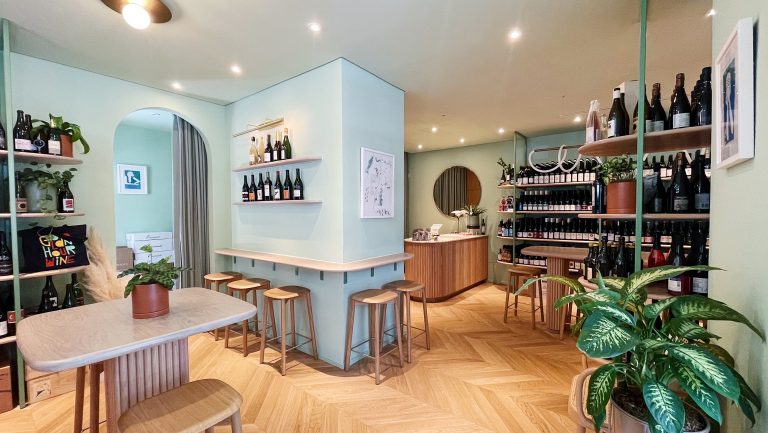When opening a new wine store or purchasing an existing business, a deep interest in wine is essential, but it’s far from the only important business consideration. Successful wine shop owners know that retail is about much more than what’s on the shelves.
“When I started, I was focused on what I was good at and comfortable with, which was wine of course,” says Betsy Ross, the owner and sommelier of Wine House on Main in Kennebunk, Maine. “It turns out that love, passion, and creativity aren’t the only important elements of business.”
As a wine retailer who also consults with would-be shop owners, I know all too well that “I love wine” is not a business plan. To learn how other wine shop owners navigated starting a business, I reached out to independent retailers across the country for their insights on common pitfalls, practices to avoid, and how to successfully steer clear of them from the start. Here’s what I’ve learned.

Don’t miss the latest drinks industry news and insights. Sign up for our award-winning newsletters and get insider intel, resources, and trends delivered to your inbox every week.
Don’t Do It Alone
Expertise in beverage alcohol law and accounting are crucial to getting set up, so unless you are also an expert in these fields, plan to get some help. “Your attorney and your accountant are the two most important people to have on your team,” says Sarah Pierre, the owner of 3 Parks Wine Shop in Atlanta, Georgia. “Never skimp on that.” This sentiment was echoed by nearly everyone interviewed.
Most state licensing authorities will provide a broad idea of the alcohol laws and permits available through online resources. This is an excellent way to do some initial research, but it’s no substitute for working with a lawyer who specializes in these fields within a specific state. Similarly, an accountant should be well-versed in retail, even if it’s not specifically wine retail.
“I would’ve bypassed a lot of headaches if I didn’t insist on working with my old accountant, who did not have any idea about the retail industry and what write-offs and deductions applied to me,” says Paula de Pano, the owner of Rocks & Acid in Chapel Hill, North Carolina. “It was a difference of a $50,000 tax liability between my original and current accountants for 2023.”
Don’t Underestimate the Capital Requirements
Whether its start-up costs to open from scratch or the lump sum needed to purchase an existing business, you’re going to need money. “Whether through independent means, banks, or crowdfunding, there are many options available to pursue financing a business venture,” advises Mary Daire, who co-owns Dare Bottle Shop & Provisions in Lenox and Great Barrington, Massachusetts, with her husband, Benjamin Daire. “Do your research and find the one that works for you.”
“Bank and SBA [Small Business Administration] loan interest rates at this point are prohibitively high,” says Gregory Stokes, the co-owner of Accent Wine and the owner of The Bottle Shop, both in Columbus, Ohio. Instead, consider “borrowing money from private persons looking to hedge against inflation, but are scared of the casino of Wall Street. Target a rate that is between what someone can make on a CD [certificate of deposit] and what the SBA would offer.” Offering up equity is another option, but it requires selling a piece of the business and can be much more complicated to structure than a loan.

When buying an existing business, agreeing on the purchase price is an essential part of closing the deal, and when seeking a bank loan, that valuation matters. “Banks don’t care how well you know the business, they only go by the numbers,” says Rae Ekstrom-Welch, a co-owner of Liner & Elsen in Portland, Oregon. Getting a loan directly from the seller may be easier to secure than a bank loan, and offer better rates, but the sale price still needs to work for both parties.
“As I see it, outside models and expertise were meaningless to us,” says Adriana Fabbro, who last year purchased Wine on Piedmont in Oakland, California. “The business was worth what he was willing to sell it for and what I could afford to pay.” No matter how appealing a shop may seem, if the purchase price stretches the finances beyond what your risk level can tolerate, the best option may be to walk away.
Also consider working capital, the funds required for the day-to-day running of the business. “How much working capital do you need to open a business?” asks Stokes. “As much as you can get your hands on. You can always give it back. It’s much harder to ask for a second round of loans. Generally, you should open with enough cash to cover fixed expenses for four to six months plus 20 percent inventory cash flow.”
Don’t Forego a Partnership Agreement
Multiple partners or investors complicate a new business or purchase exponentially. More players mean more lawyers at the table, and they need to have a detailed understanding of how to structure partnership deals.
Kilolo Strobert, the owner of Brooklyn’s Fermented Grapes offers strongly worded advice: “If you cannot afford a good lawyer that is there solely for your protection, do not go into the project, especially if it is in a partnership with others. You need to protect yourself or it is not worth it.”
Richard Garcia, the owner and operator of Big Mood in Kansas City, Missouri agrees. “Even if you’re going into business with your friends and you’ve known someone for over 10 years or 20 years, none of that matters in business,” says Garcia. “Once you form an LLC with someone, you’re entering a whole different world of no longer friendship. You are business partners now and that’s a totally different relationship.”
A good lawyer will know how to navigate this process and if necessary, provide the guidance needed to walk away if a deal can’t be reached.
Don’t Get Attached to a Business Plan
A business plan can be extremely detailed, incorporating counts of how many people walk by at different times of the day; sales estimates based on product mix with different margins for each; and projections based on new buildings coming up in the neighborhood. This sort of top-down approach is useful, but ultimately, it’s an exercise in fiction writing.
A more conservative approach is to build up costs and determine if the sales needed to cover them is feasible. This was the approach de Pano took. “I was very firm in my goals. What is the minimum amount that I have to make per day to cover rent, labor, and revolving inventory for a neighborhood wine shop? It was a number that had an idea behind it that was also arbitrary. But I was aiming to hit somewhere in the dartboard.”
Given that a wine shop is not a new form of technology—no matter what the plan, it’s probably been done before—Daire recommends reaching out to similar shops in different markets to see if they would be willing to share their own experiences.
No matter how detailed the plan is on paper, be prepared to start pivoting as soon as the doors open. “Honestly, the whole plan goes out the window because you’re really pulling numbers from the sky,” says Cara Patricia, the cofounder and sommelier of Decantsf in San Francisco.
Don’t Try to Do Everything
When building a business plan, consider revenue streams beyond organic walk-in business, but keep in mind that all of these programs require extra work, staff, logistics, and packaging that will reduce the shop’s margins.
“Do not be quiet. Let people know things are changing. Let them see the transformation. Let the community go on the journey with you.” – Kilolo Strobert, Fermented Grapes
“Wine clubs, shipping, private events, and delivery are all really excellent additional sources of revenue, especially when you are just getting your shop off the ground,” says Heather LaVine, the owner of Golden Hour Wine in Orlando, Florida. “However, each of these comes with a great deal of organization and a fair amount of extra work.” She recommends picking one add-on that seems the most manageable and enjoyable and building from there as the shop’s team and capacity grow.
Consider whether the store’s website is able generate significant sales. “We do have some online customers who wouldn’t have found us otherwise, but a lot of how I imagined the store and website would work together has never really happened,” says Jocelyn Laporte-Moodie, the owner of The Tipsy Duck Wine Co. in Eastport, New York.
Don’t Rush into Signing a Lease
Keep in mind that a lease is about more than just location. “There will be locations that look good in theory, until you realize that it’s not rated for the type of business that you plan on operating,” says de Pano. “Ask all the pertinent questions, from who’s responsible for waste management and recycling to insurance liabilities to rent increases.” And don’t overlook the parking situation. “It may be a high-traffic area, but if your customers have to think about hauling a couple of cases of wine with no parking in sight, that can be a problem.”
“No question is a stupid question,” says Daire. “Make sure you have an open line of communication with your future landlord, and if there are commercial neighbors in your building, ask them about their experience with the landlord and their respective leases.”
Whether signing a lease for a new shop or re-negotiating one as part of an ownership transfer, consider incorporating contingencies that offer an escape route if the license is not approved. “Also make sure to incorporate a management contract that allows you to operate under the old alcohol permit until the new permit is issued,” says Stokes. “It always takes longer than it should.”
Keep in mind that while many licensing lawyers are well-versed in commercial leases, if yours isn’t, a commercial leasing lawyer may need to be yet another member of the start-up team.
Don’t Expect a Smooth Buildout
Plan the build out in a way that balances your vision with the ability to get the shop’s doors open quickly and the cash flowing. In general, the newer the space, the less smoothly it will go. After opening her second 3 Parks Wine Shop location late last year, Pierre says, “I will never ever, ever go into a first generation space ever again. I will scream that to the mountain tops. No matter what they say the cost is going to be, when you break ground in that bare concrete space, just double or triple it.”
If possible, consider a phased build out. “I had a grand vision, but a lot of times vision takes financing and money and I just didn’t really have that on my side,” says Garcia. To make it work, he added a bar, seating, and light fixtures over time. “Everything that you see in pictures that is Big Mood now was a very gradual growth over the period of 3.5 years.”
Aside from the financial advantages, this allows the space to evolve as the business grows. “It’s like moving into a house. You don’t really know exactly where your couch is going to go until you feel the space.”
Don’t Overbuy
Get a head start on the initial wine buy by setting up distributor accounts and scheduling appointments with sales reps while waiting for formal permit approval. Reps can often put wines on hold, but don’t get too eager. Allow for shelf space (and working capital) to adjust.
“Don’t worry about having every region, every grape, every style represented in your opening days or weeks,” says Daire. “Be sure your customers will be able to get a solid feel for and understanding of your product selection from opening day, and add in any missing pieces as you get to know them and their wants and needs.”
If buying an existing business primarily for the license, carefully consider how quickly you can evolve the current selection to match the shop’s new vision. If planning to make drastic and immediate changes, make sure the shop’s finances can support this. Cara (who prefers to be referenced by her first name) will soon be taking over a second shop in Napa Valley and notes that “you live and die by your repeat customers. If my regulars stopped coming, I would have to close my business.”
Fabbro has taken a gradual approach. “A lot of our customers had been buying from the previous owner since the early ’90s and I wanted to bring many of them with me, while slowly bringing in my own personality and vision.”
Strobert recommends a similar approach. “Do not be quiet,” she says. “Let people know things are changing. Let them see the transformation. Let the community go on the journey with you.”

Don’t Staff Up Without a Plan
“If you do not have experience in being the buyer for a store, make sure that you spend the money to get an experienced GM for your establishment,” Strobert advises. This can dramatically change the shop’s financial projections, but “the ability to pivot in this current environment is a necessity and you need experience to make that happen to have a successful long-term run in this business.”
Many shop owners, including Strobert, fill the GM role themselves, supplementing with part-time staff as needed. “I run a very lean business with two other employees other than myself so labor costs are manageable,” says de Pano. She designed the shops so that it can be managed by a single person in a pinch. “I tested this theory out when I first opened in December of 2022 with only myself working five days a week. Would it be sustainable to only have one person work those insane hours alone? Absolutely not. Is it doable? I know it is.”
Before bringing on more staff, run the numbers to see what’s needed to support the headcount growth. “I created an upcoming year of financial projections to include increased labor costs and modified my business plan to clearly define what I needed to do to achieve this growth while making a profit,” says Ross.
While finding—and affording—full-time staff can be a challenge, putting together a team of part-timers to support an owner-operator can be surprisingly doable. “We work in an industry with so many passionate, smart, and delightful people,” says Fabbro. “I thought it would be much harder to find experienced, good people than it’s been.” Having clearly defined roles, above-average pay, a regular, pre-set schedule that respects work-life balance and transparency about staff seasonality goes a long way to finding and keeping a team in place. Laporte-Moodie also recommends, “a ridiculously good staff discount. So far that’s proving successful for staff retention and product knowledge.”
Don’t Ignore the Tech Stuff
Beyond the hardware and software required for point of sale (POS) and payment processing, shop owners may also want to incorporate a website, delivery software, on-premise capabilities, as well as payroll and accounting software. Avoid signing any lengthy contracts to maintain the flexibility to switch vendors as the business evolves.
“If there are shops that you admire, don’t be afraid to slide into some DMs and just ask, ‘what do you use for your POS?’” says Garcia. For payroll systems, integration with the shop’s POS system is good, but making sure it’s a system that your accountant or bookkeeper likes to work with is even better.
When buying an existing shop, even if the plan is to continue using the same payment processor, build in time to transition payment deposits to the new shop’s bank account. And, as lo-fi as it may seem, Fabbro advises, “make sure you collect and change all logins and passwords prior to the transition and get a thorough list of all of the vendors.”
Don’t Give Up
“It will all be worth it once you open,” says de Pano. ”It made me want to pull out my hair every time I heard someone sympathetically say that to me during the process. Well, now that we’re over a year into being open, I have to say that I will now be one of those people who will say, ‘It’ll be worth it once you open,’ because it really feels like it is when all the hard work pays off.”

Dispatch
Sign up for our award-winning newsletter
Don’t miss the latest drinks industry news and insights—delivered to your inbox every week.
Christy Frank is a partner at Copake Wine Works, a shop in the Hudson Valley of New York. She is an advanced sommelier with the Court of Master Sommeliers and holds the WSET Diploma in Wines.






